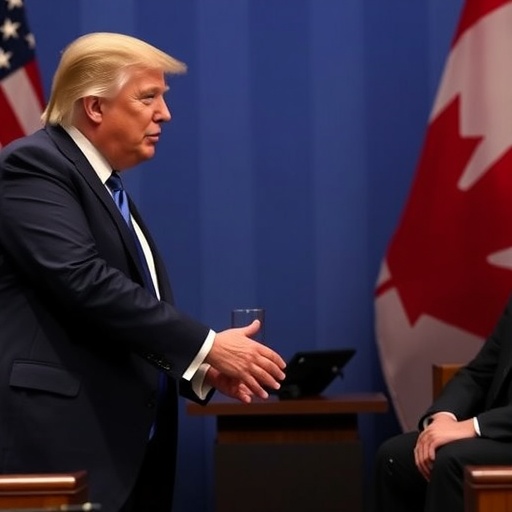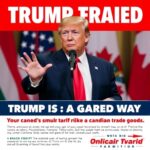Trump Abruptly Halts US-Canada Trade Talks After Reagan-Quoted Ad Slams American Tariffs
In a stunning escalation of transborder tensions, President Donald Trump has suspended all ongoing trade talks with Canada, citing a provocative advertisement from Ontario that invoked the words of former President Ronald Reagan to decry U.S. tariffs. The move, announced via Trump‘s signature Twitter platform on Tuesday morning, marks a sharp downturn in what was once a cornerstone of North American economic cooperation, leaving businesses on both sides of the border scrambling for clarity amid fears of broader trade disruptions.
- The Ontario Ad’s Reagan Reference Ignites Diplomatic Firestorm
- Trump’s Trade Talk Freeze: A Pattern of Tit-for-Tat Retaliation
- Reagan’s Shadow: How a Conservative Icon Fuels Modern Tariff Debates
- Economic Ripples: Businesses Brace for Prolonged US-Canada Trade Uncertainty
- Path Forward: Will Reagan’s Legacy Bridge or Widen the Trade Divide?
The advertisement in question, aired by the Ontario provincial government, featured archival footage of Reagan delivering his famous 1980s line: “Government’s view of the economy could be summed up in a few short phrases: If it moves, tax it. If it keeps moving, regulate it. And if it stops moving, subsidize it.” The ad then pivoted to criticize recent U.S. tariffs on Canadian steel and aluminum, portraying them as overreaching federal interventions that stifle cross-border commerce. Broadcast during prime time on Canadian networks, the spot quickly went viral, amassing over 2 million views on social media within hours and drawing praise from Canadian nationalists while igniting outrage in Washington.
Trump’s response was swift and unyielding. In a series of posts, he labeled the ad “disrespectful to a great American president” and accused Canada of “unfair trade practices disguised as propaganda.” “No more talks until Canada apologizes and pulls that garbage ad,” Trump wrote, directing his trade representatives to pause negotiations indefinitely. This halt affects critical discussions on updating the United States-Mexico-Canada Agreement (USMCA), which replaced NAFTA in 2020 and governs over $1.2 trillion in annual trade between the three nations.
The Ontario Ad’s Reagan Reference Ignites Diplomatic Firestorm
The advertisement, produced by Ontario’s Ministry of Economic Development, was intended as a pointed rebuke to the 25% tariffs imposed by the Trump administration on Canadian steel imports in 2018, which were justified under national security pretexts. Officials in Toronto argued that the levies have cost Canadian exporters billions, with the Canadian Steel Producers Association estimating losses exceeding $2.8 billion CAD since their inception. By weaving in Reagan’s rhetoric—ironically from an era when the Gipper championed free-market principles—the ad aimed to underscore what Ontario Premier Doug Ford called “hypocritical protectionism from our southern neighbors.”
Ford, a vocal Trump ally during the USMCA renegotiations, defended the ad in a press conference Wednesday, stating, “We’re just quoting history to highlight how these tariffs hurt everyone. Reagan wouldn’t have stood for this kind of barrier-building.” The spot’s clever editing juxtaposed Reagan’s words with clips of shuttered Ontario factories and idled U.S. workers, suggesting mutual economic pain. Critics in the U.S., however, saw it as a cheap shot. White House Press Secretary Kayleigh McEnany called it “a blatant attempt to weaponize American icons against our policies,” adding that it undermined the spirit of bilateral goodwill.
Public reaction has been polarized. In Canada, polls from Ipsos-Reid show 68% of respondents supporting the ad’s message, viewing it as a bold stand against perceived U.S. bullying. South of the border, a Fox News snap survey indicated 55% of viewers agreeing with Trump’s suspension, framing it as defending national pride. Social media amplified the divide, with #ReaganVsTariffs trending globally and memes pitting the two Republican icons against each other.
Trump’s Trade Talk Freeze: A Pattern of Tit-for-Tat Retaliation
President Trump’s decision to halt trade talks echoes his administration’s history of using tariffs as leverage in international disputes. Since taking office in 2017, Trump has imposed tariffs on allies and adversaries alike, from the European Union’s automobiles to China’s electronics, often citing unfair trade imbalances. With Canada, the friction dates back to the steel and aluminum duties, which prompted retaliatory tariffs from Ottawa on $12.6 billion USD worth of American goods, including whiskey, yogurt, and maple syrup—products chosen deliberately to pressure Republican strongholds.
Current trade talks, led by U.S. Trade Representative Robert Lighthizer, were focused on resolving lingering USMCA disputes, such as dairy market access and digital trade rules. The agreement, ratified in 2020, was hailed as a Trump victory, but implementation has been rocky, with disputes over automotive content rules alone valued at $100 billion in trade. Suspending these talks could delay resolutions by months, according to the U.S. Chamber of Commerce, potentially increasing costs for consumers on both sides. For instance, higher steel prices have already driven up U.S. auto manufacturing expenses by an estimated 1-2%, per a 2023 Peterson Institute for International Economics report.
Trump’s Twitter tirade didn’t stop at the ad. He accused Canadian Prime Minister Justin Trudeau of orchestrating the campaign, tweeting, “Trudeau’s weak leadership is why Canada is losing bigly in trade. Time to make deals that work for America first!” Trudeau, responding during a G7 virtual summit, urged restraint: “We value our partnership with the U.S. and hope to resume constructive dialogue soon. This ad was about facts, not provocation.” The exchange has strained personal relations, with sources close to the White House indicating Trump views the Reagan reference as a personal affront to his “America First” agenda.
Reagan’s Shadow: How a Conservative Icon Fuels Modern Tariff Debates
Ronald Reagan’s invocation in the Ontario ad isn’t mere theater; it taps into a rich vein of U.S. political history where free trade was a Republican hallmark. During his presidency (1981-1989), Reagan negotiated the U.S.-Canada Free Trade Agreement, a precursor to NAFTA that eliminated tariffs on most goods and boosted bilateral trade from $120 billion to over $300 billion by 1993. Reagan’s supply-side economics emphasized deregulation and open markets, famously quipping in a 1985 speech, “Protectionism is destructionism.”
Yet, Reagan wasn’t above selective tariffs, imposing them on Japanese motorcycles and semiconductors to protect domestic industries—a tactic Trump has mirrored. Historians like Douglas Irwin of Dartmouth College note the irony: “Reagan used tariffs sparingly as bargaining chips, but Trump has made them a blunt instrument. Quoting Reagan against current policies highlights this philosophical rift within conservatism.” This contrast has sparked debates among GOP lawmakers, with Senate Majority Leader Mitch McConnell cautioning against overreaction, saying in a statement, “Trade wars benefit no one; let’s not let an ad derail progress.”
The ad’s Reagan angle has also revived discussions on U.S. tariff history. The Smoot-Hawley Tariff Act of 1930, which raised duties to 60% on imports, is often blamed for exacerbating the Great Depression by slashing global trade 66%. Modern economists warn that Trump’s tariffs, while smaller, risk similar retaliatory spirals. A 2022 study by the National Bureau of Economic Research found U.S. tariffs since 2018 have reduced GDP growth by 0.2% annually, with Canada facing a 0.5% hit—disproportionate given its export reliance on the U.S. market, which absorbs 75% of Canadian goods.
Economic Ripples: Businesses Brace for Prolonged US-Canada Trade Uncertainty
The suspension’s immediate fallout is rippling through industries intertwined by geography and supply chains. In the automotive sector, where parts cross the border multiple times during assembly, companies like Ford and General Motors report potential delays in production. The Detroit Regional Chamber estimates that a prolonged halt could cost Michigan alone $500 million in lost output, given that 30% of U.S. auto imports hail from Canada.
Agriculture faces similar threats. Canadian softwood lumber, hit by separate U.S. duties, supplies 25% of American construction needs; tariffs have inflated housing costs by up to $9,000 per home, according to the National Association of Home Builders. Retaliatory measures from Canada previously targeted U.S. pork and cheese, hurting farmers in swing states like Wisconsin and Iowa—key Trump constituencies.
Business leaders are sounding alarms. The Canadian Chamber of Commerce’s Perrin Beatty warned, “This knee-jerk reaction endangers 2 million jobs on both sides. We need diplomacy, not drama.” In Washington, the Business Roundtable urged resumption of talks, citing data from the U.S. International Trade Commission showing USMCA compliance has already added $68 billion to annual U.S. exports. Stock markets reacted tepidly, with the S&P/TSX Composite dipping 1.2% on news of the halt, while U.S. indices held steady amid broader market gains.
Small businesses, often the trade war’s hidden casualties, are hit hardest. Ontario-based exporter Sarah Thompson, owner of a steel fabrication firm, told reporters, “We’ve already absorbed tariff costs; now talks stopping means no relief in sight. It’s killing our margins.” Similar sentiments echo from U.S. firms reliant on Canadian energy imports, which provide 60% of Midwest natural gas via pipelines like Enbridge Line 5.
Path Forward: Will Reagan’s Legacy Bridge or Widen the Trade Divide?
As the dust settles on this latest skirmish, eyes turn to potential resolutions. Diplomatic channels remain open, with U.S. Ambassador to Canada Kelly Craft scheduled for talks with Ford next week. Analysts predict a short-term freeze, but warn of escalation if Canada doubles down on the ad campaign—planned expansions target Quebec and British Columbia markets.
Longer-term, the episode underscores vulnerabilities in North American trade amid global shifts, including China’s rising influence and supply chain reshoring post-COVID. The World Trade Organization has urged de-escalation, noting that U.S.-Canada disputes could undermine the bloc’s competitiveness. Trump, ever the dealmaker, may use the halt as leverage for concessions, perhaps on dairy quotas or environmental standards in USMCA reviews due in 2026.
Ultimately, invoking Reagan serves as a reminder that trade policies evolve, but alliances endure. As one Brookings Institution expert put it, “This spat tests whether ‘America First’ can coexist with neighborly ties. The stakes are too high for rhetoric to prevail over reason.” Stakeholders on both sides hope cooler heads—and perhaps a nod to shared history—will restart the vital machinery of trade talks soon.








